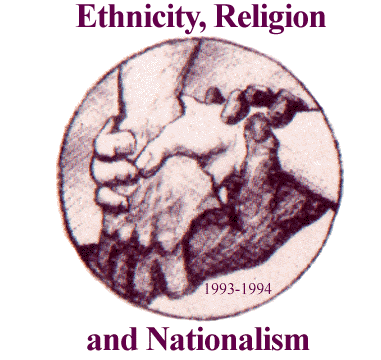- About this Program
- 2012 Conflict in the 21st Century
- 2011 Our Nuclear Age: Peril and Promise
- 2010 South Asia: Conflict, Culture Complexity, and Change
- 2009 Cities: Forging an Urban Future
- 2008 Global Poverty and Inequality
- 2007 Global Crises: Governance and Intervention
- 2006 The Politics of Fear
- 2005 Oil and Water
- 2004 Dilemmas of Empire and Nation Building
- 2003 Sovereignty and Intervention
- 2002 Global Inequities
- 2001 Race and Ethniciity: A Global Inquiry
- 2000 Global Games: Sports, Politics, and Society
- Symposium
- 1999 Global Crime, Corruption, and Accountability
- 1998 Exodus and Exile: Refugees, Migration, and Global Security
- 1997 The Future of Democracy
- 1996 Religion, Politics, and Society
- 1995 20/20 Visions of the Future
- 1994 Ethnicity, Religion and Nationalism
- International Symposium
- Professional Workshops
- 1993 Transformations in the Global Economy
- 1992 - International Security: The Environmental Dimension
- 1991 Confronting Political and Social Evil
- 1990 The Militarization of the Third World
- 1989 Drugs, International Security and U.S. Public Policy
- 1988 Foreign Policy Imperatives for the Next Presidency
- 1988 Covert Action and Democracy
- 1987 The West Bank and Gaza Strip
- 1986 International Terrorism
- News
- Press Clips
- Calendar
- Resources
EPIIC Archives
1994 Ethnicity, Religion and Nationalism

|
|
Civil war, separatism, irredentism, ethnic "cleansing," massive refugee flows and "failed states" typify the complex issues that may be the most urgent foreign policy and ethical challenges the international community faces in the 1990s. From the former Yugoslavia to Guatemala; from Khalistan to KwaZulu; from Nagorno-Karabakh to the West Bank, this symposium was a multidisciplinary inquiry into the universal and contemporary political dilemmas of kinship, religion, territoriality and self-determination in the post-Cold War era. Since World War I, these dilemmas have claimed the lives of over 20 million people and deeply affected the lives of millions more.
What constitutes a "people"? A civilization? What is a minority? What political and pschological factors are involved in ethnic conflict? What are the unique contexts under which identities are transformed into serious political conflict? Under what conditions do identities provoke confrontations of intergroup and intragroup aggression and political violence? What is the progress of the development of civil society? Of the representation and protection of individual and group rights? What is the concept of citizenship? Is the nation-state inherently flawed and detrimental to minority rights?
Are Cold War perspectives on self-determination outdated? Should borders and states be defended? Under what circumstances is the recourse to national self-determination desirable? What frameworks or criteria can be established to inform a timely response to prevent future Bosnias, from the protection of minority rights to cultural and/or political autonomy to independent statehood?
Understanding the nature of ethnic and religious conflict, how can negotiation be fostered and encouraged? What is the role of the international community? Of the United States? Of multilateral organizations? Of international law? How should they evolve to meet the challenges of an increasingly complex world?

